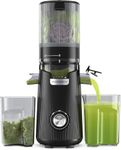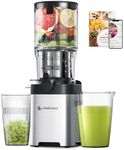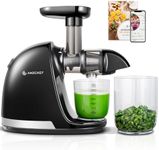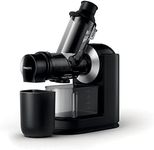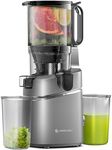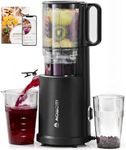Buying Guide for the Best Cold Pressed Juicers
Choosing the right cold-pressed juicer can significantly enhance your juicing experience, allowing you to enjoy fresh, nutrient-rich juices at home. Cold-pressed juicers, also known as masticating juicers, work by crushing and pressing fruits and vegetables to extract juice, preserving more nutrients and enzymes compared to traditional juicers. When selecting a cold-pressed juicer, it's important to consider several key specifications that will affect the quality of juice, ease of use, and overall satisfaction with the product.Juice YieldJuice yield refers to the amount of juice extracted from fruits and vegetables. A higher juice yield means more juice and less waste, which is important for getting the most out of your produce. Cold-pressed juicers are known for their high juice yield compared to centrifugal juicers. When evaluating juice yield, consider how much juice you want to produce and how often you plan to juice. If you juice frequently or in large quantities, a juicer with a high yield will be more efficient and cost-effective in the long run.
Motor PowerMotor power in cold-pressed juicers is measured in watts and indicates the strength of the juicer's motor. A more powerful motor can handle tougher produce and operate more efficiently without overheating. Motor power typically ranges from 150 to 250 watts for most home juicers. If you plan to juice hard vegetables like carrots or beets regularly, a juicer with higher motor power will be beneficial. For softer fruits and leafy greens, a lower wattage may suffice.
Speed SettingsSpeed settings in a cold-pressed juicer determine how fast the juicer operates. Most cold-pressed juicers have a single speed, but some offer multiple speed settings to accommodate different types of produce. Lower speeds are ideal for soft fruits and leafy greens, while higher speeds can be used for harder vegetables. If you want versatility in juicing a wide range of produce, consider a juicer with adjustable speed settings. However, if you primarily juice similar types of produce, a single-speed juicer may be sufficient.
Ease of CleaningEase of cleaning is an important factor to consider, as juicers can have multiple parts that require thorough cleaning after each use. Some juicers are designed with fewer parts or dishwasher-safe components, making them easier to clean. If you plan to juice frequently, a juicer that is easy to disassemble and clean will save you time and effort. Look for models with cleaning brushes or self-cleaning features to further simplify the process.
Size and DesignThe size and design of a cold-pressed juicer can affect where and how you use it in your kitchen. Consider the counter space you have available and whether you need a compact model or if you have room for a larger unit. Additionally, the design can impact the ease of use and storage. If you have limited space, look for a juicer with a vertical design that takes up less counter space. If aesthetics are important to you, consider the color and style that will best match your kitchen decor.
Noise LevelNoise level is an important consideration, especially if you plan to use your juicer early in the morning or late at night when others might be sleeping. Cold-pressed juicers are generally quieter than centrifugal juicers, but noise levels can still vary between models. If noise is a concern, look for a juicer that is specifically marketed as quiet or has user reviews mentioning low noise levels. This will ensure a more pleasant juicing experience without disturbing others.

